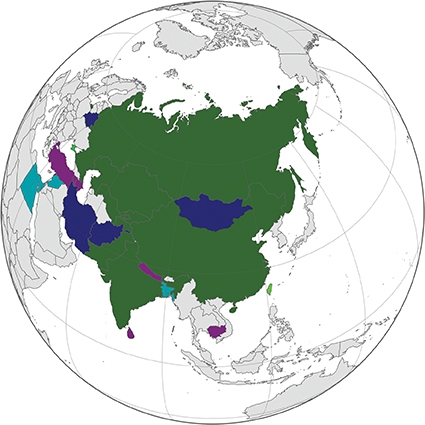Expecting Major Geopolitical Shifts in Asia
Op-ed
This year has seen a string of important political developments, among which the expansion of the Shanghai Cooperation Organization (SCO) is arguably the largest. Following years of negotiations on accession, this year India and Pakistan were finally admitted as full members of the organization. The expansion broadens the geopolitical potential of the organization. A look at the Eurasian map reveals that now more than 2/3 of the landmass is in the SCO and all major ports and economic routes now belong to the member states.
There are other advantages, too. For instance, China will gain from India and Pakistan’s accession to the SCO in the security sphere. Pakistan, due to its location and involvement in Afghanistan’s internal affairs, offers China and the SCO an important partner in fighting extremism, separatism and other forms of violence. The same concerns drive Russia, which fears that Afghan militancy may spill over into the Central Asian region. China, in particular, wants the SCO’s Regional Anti-Terrorist Structure (RATS) to gain more relevance and for there to be more coordination in terms of military activities, information sharing and confidence building.
To understand the major drawbacks of the SCO as an organization before the current expansion, we need to look at the geopolitical imperatives of the organization’s most powerful states, Russia and China. Russia envisioned the SCO to eventually develop into a military alliance that would rival NATO. China, on the other hand, wanted to organize the SCO as a future economic platform for expanding its economic and political clout in Central Asia. The stalling of the organization was primarily conditioned by these differing visions of China and Russia.
Thus, the geopolitical imperatives of Russia and China have been quite different. What is worrisome is that the inclusion of India and Pakistan could further complicate the potential for evolving the organization into a more serious regional player.
India’s entry could especially frustrate Beijing because of rising geopolitical competition between the Asian giants and different approaches to counterterrorism. As a reflection of the disagreements in May this year, India decided not to send a delegation to Beijing’s Belt and Road Initiative Summit. The Indian opposition to the project stems from the plan to build the corridor through the disputed Kashmir region and to connect it to the strategically important port of Gwadar in Pakistan.
The effective work of the organization would be further constrained by Pakistan and India’s different understandings of terrorism. For instance, they have different views on whether cross-border attacks in Kashmir are considered terrorism. In 2016, Pakistan accused India of working to sabotage China's plans to build an economic corridor through the country.
Beyond the Pakistan-India confrontation, there are also serious constrains on India-China relations. India tacitly supports the Dalai Lama and the Tibetan government, which causes irritation in Beijing. The latter, from its side, persistently defends Pakistan’s actions in Kashmir militancy, which complicates relations with India.
Any potential cooperation between China and India is quite limited, as the developing Doklam dispute, with Chinese and Indian troops facing each other, is yet another example of tense relations between the two powers. Beyond Kashmir, India and China also confront each other in the maritime domain. For example, the Indian government recently strengthened its position in the strategic Andaman and Nicobar island chain in order to counter the Chinese “string of pearls” strategy. The strategy involves gaining access to important naval ports across the Indian Ocean which would be militarily advantageous in case of major conflict.
Russia’s Position
From its announcement in 2001, the SCO provided Beijing with a very effective tool in expanding primarily its economic influence over the Central Asian states dominated by Russia. But, today, more than 15 years later, China has made big strides in gaining economic upper hand in the region as well as already making inroads into the security realm. This all happens as Russian economic influence recedes and the country faces significant pressure from the West. Therefore, Russia’s decision to have India as a member of the SCO is likely driven by the need to further improve bilateral economic and security cooperation and also to limit China’s ever-growing influence in the organization and the Central Asian region. Indeed, Russia is increasingly concerned that in the longer run, Kazakhstan, Kyrgyzstan, Tajikistan, and Uzbekistan are tilting too far into China’s fold.
Emil Avdaliani












